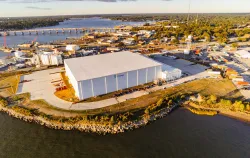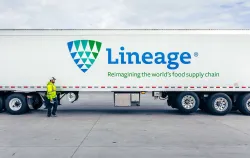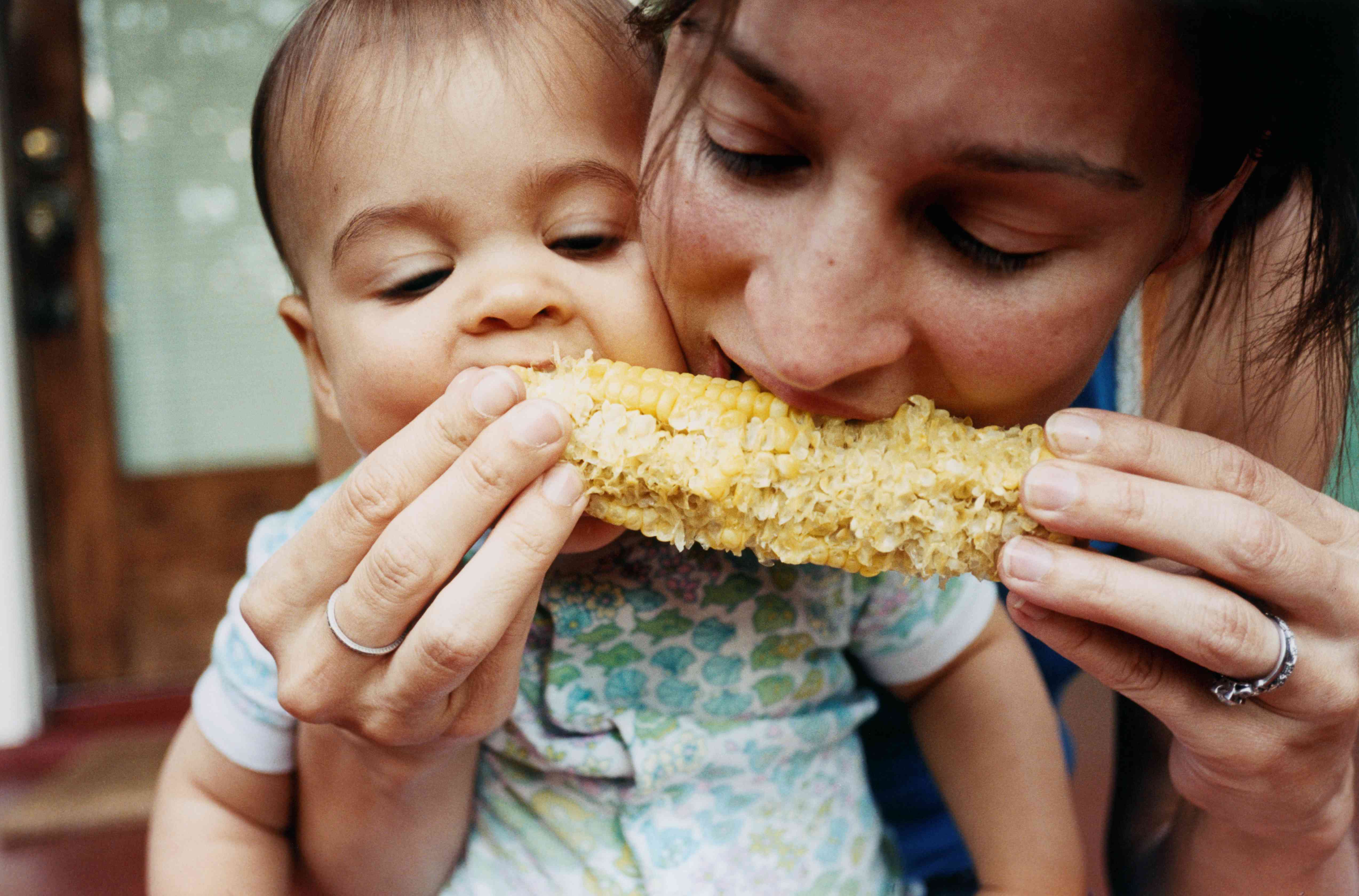Food Waste: A Problem We Can Solve Together
Part 2 of our Deep Dive on Food Waste
June 24, 2025
In our previous post, we outlined how the many causes of food waste add up to millions of pounds of food lost each year, contributing to greenhouse gas emissions and wasted resources. While this is a huge problem, we also view it as an opportunity. Addressing root causes of food waste can reduce food insecurity and create a more sustainable food system.
Lineage, one of the world’s largest cold chain companies, is leading the industry in reimagining a food supply chain with less waste. By incorporating Lean principles, leveraging data-driven insights and investing in new technologies, we’re working to eliminate waste in our operations and help feed the world.
But tackling a problem as large and complex as food waste requires collective action. In this post, we’ll explain the role the broader cold chain plays in reducing food waste and what Lineage is doing differently to create a more sustainable food chain. We’ll also look at some nonprofit organizations who are working to fix our broken food system. Finally, we’ll explore a few other new ideas and innovative solutions that show promise in the fight to end food waste.
In the end, we hope you see there are many possible ways we can transform the food chain together and are inspired to take action to end food waste.
The Role of the Cold Chain in Reducing Food Waste
The cold chain is the vital infrastructure that stores and transports perishable food on its journey from where that food is produced to consumers’ plates. It’s comprised of a vast network of temperature-controlled warehouses, logistics hubs, refrigerated transportation vehicles like trucks or rail cars and the thousands of workers who serve as the guardians of our food.
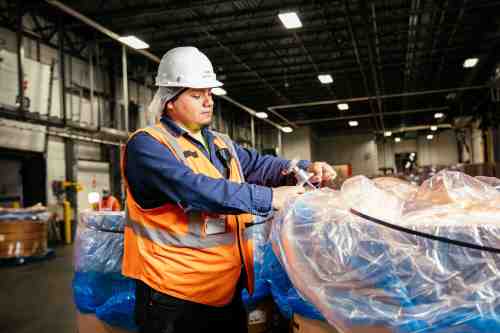 By its very nature, the cold chain plays a big role in reducing food waste as it combats two major factors of food spoilage: temperature and time. After all, many foods require or benefit from refrigeration or freezing, and timely transportation options can extend the amount of time consumers have to eat that food.
By its very nature, the cold chain plays a big role in reducing food waste as it combats two major factors of food spoilage: temperature and time. After all, many foods require or benefit from refrigeration or freezing, and timely transportation options can extend the amount of time consumers have to eat that food.
There’s an adage some cold chain professionals use to describe their work: “Keep it cold, keep it covered and keep it moving.” It’s a vast oversimplification of the reality. They are responsible for storing and handling huge quantities of different kinds of perishable food, often at different temperatures and for varying amounts of time, to help it reach your plate safely. This challenging yet essential work requires frequent monitoring and temperature checks, proper logging of multiple data points for thousands of products, adherence to safety protocols and compliance with regulations which can vary dramatically by product type and geography.
Lineage team members are proud of the role we play as shepherds of the food supply chain, and we use standardized processes to handle our customers’ products carefully to meet both food safety standards and our customers’ quality expectations while they are in our control.
Our Food Optimization team plays a pivotal role in these efforts and, in rare cases where product quality is affected, works to find alternative pathways to prevent food from ending up in landfills.
Consider this example: A product is deemed unsellable due to a typographical error on the packaging. If food safety and quality are not in question, the customer may agree to redirect the product to secondary markets, such as discount stores. This gives the food another chance to reach consumers rather than being sent to a landfill. Secondary markets represent one of multiple solutions to prevent food waste. Other options include donating products to food banks or shelters and repurposing certain foods as animal feed or composting.
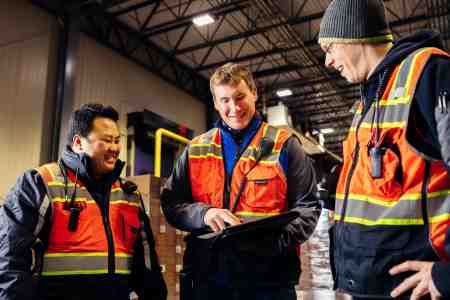 In addition to these types of processes, advancements in IoT, telematics and sensors present another opportunity to combat wasted food. Deployment of these types of devices across the cold chain can assist in flagging potential problems before they result in food loss. For instance, certain telematics systems monitor temperatures in trucks or rail cars in real-time and send an alert when there’s a possible issue. This gives cold chain professionals a chance to react quickly to prevent food spoilage. Similarly, cold storage facilities that handle fresh produce can use ethylene sensors to monitor and control ethylene levels in rooms that store fresh fruits and vegetables to reduce the likelihood of early ripening.
In addition to these types of processes, advancements in IoT, telematics and sensors present another opportunity to combat wasted food. Deployment of these types of devices across the cold chain can assist in flagging potential problems before they result in food loss. For instance, certain telematics systems monitor temperatures in trucks or rail cars in real-time and send an alert when there’s a possible issue. This gives cold chain professionals a chance to react quickly to prevent food spoilage. Similarly, cold storage facilities that handle fresh produce can use ethylene sensors to monitor and control ethylene levels in rooms that store fresh fruits and vegetables to reduce the likelihood of early ripening.
Ways Lineage is Using Cutting-Edge Technology and Innovative Processes to Reduce Wasted Food
At Lineage, we approach innovation with the mindset of solving real-world problems. That’s why Lineage has invested in transformational technology and data science to refine our operations and reduce waste.
Lineage Link is one example of this idea in action. Lineage Link is our proprietary customer platform that empowers customers to actively manage their inventories, orders, shipments and transportation appointment scheduling across our warehouse network. The system combines data from suppliers, products, inventory, carriers and customers into a single platform that provides greater visibility and actionable insights so customers can better manage their supply chains. With all this information at their fingertips, supply chain managers can even prevent food waste by helping them keep the right amount of product in the right locations to meet demand.
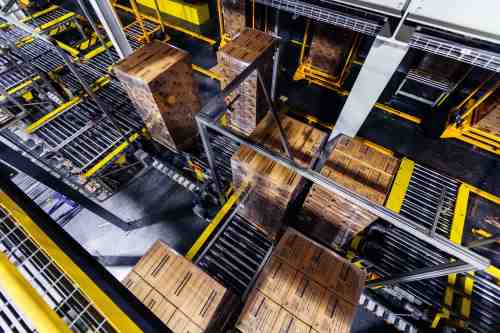 Automating certain processes within cold chain warehouse operations like pallet receiving can also help reduce food waste by increasing inventory accuracy. Lineage has developed a proprietary system called Lineage Eye that automates how pallets are received in some of its warehouses. Lineage Eye uses cameras and computer vision, a type of artificial intelligence, to identify products on a pallet, read product labels and log that information into the warehouse management system more quickly and with a greater degree of accuracy than manual receiving processes. Likewise, automated storage and retrieval systems may be used to reduce human errors during handling. While inventory accuracy may seem like a minor issue, it can have cascading effects if an incorrect item is shipped or misplaced in the warehouse, even resulting in food waste if perishable items expire.
Automating certain processes within cold chain warehouse operations like pallet receiving can also help reduce food waste by increasing inventory accuracy. Lineage has developed a proprietary system called Lineage Eye that automates how pallets are received in some of its warehouses. Lineage Eye uses cameras and computer vision, a type of artificial intelligence, to identify products on a pallet, read product labels and log that information into the warehouse management system more quickly and with a greater degree of accuracy than manual receiving processes. Likewise, automated storage and retrieval systems may be used to reduce human errors during handling. While inventory accuracy may seem like a minor issue, it can have cascading effects if an incorrect item is shipped or misplaced in the warehouse, even resulting in food waste if perishable items expire.
Additionally, we leverage our strategically located network of temperature-controlled warehouses around the world to help get perishable foods to consumers faster. Many of our facilities are located in densely populated, critical-distribution markets and port locations for this reason. Our Savannah Fresh facility is a prime case. Located near the Port of Savannah and capable of handling up to 1.4 million pounds of fresh produce per day, this location offers cross-docking services and immediate access to Interstates 16 and 95 which allows trucks to reach many key cities throughout the southeast and midwestern United States within a one- to two-day drive. That speed to market helps preserve quality and reduce food loss for these sensitive products.
And we’re just getting started! Lineage is researching and piloting new solutions with help from our Data Science team. At our biodigester pilot project in Oxnard, California, we’re turning local food waste into renewable energy using an anaerobic digester. The digester’s system processes food waste by breaking it down to produce biogas. The project reduces emissions by redirecting food away from landfills and repurposing it as a renewable energy source. The pilot project has shown exciting results, and we’re continuing to explore ways to expand biodigester technology at select sites across our network.
Nonprofit Organizations Who are Rethinking the Food Chain
Lineage isn’t working alone in the battle against food waste. Across the United States and globally, there are a number of nonprofit organizations who are rethinking how our food system can operate, helping create a more sustainable and well-fed future in the process.
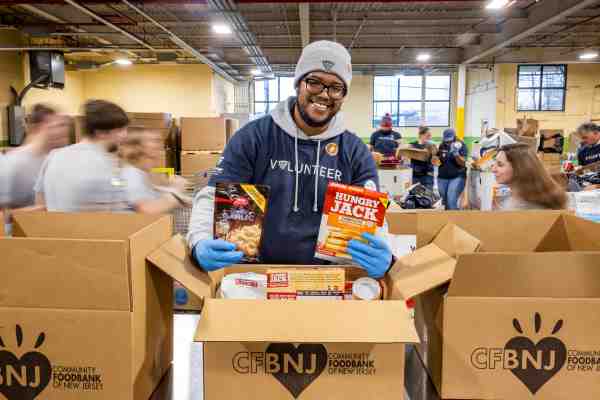
The Lineage Foundation for Good, an independent nonprofit organization, is one example. The Foundation is driven by its core mission of reducing food waste and fighting food insecurity. It aims to create a dynamic link between food producers and communities that allows safe, quality food that would have otherwise gone unconsumed to quickly and easily be directed to those in need.
To bring this idea to life, the Foundation created the Customer Product Donation Program to encourage and facilitate donations from customers storing food in a Lineage facility. Thanks to this program and the generosity of Lineage customers, more than 41 million pounds of food have been donated – from frozen fruits and vegetables to pizzas and pastas! These products are sent to hunger relief agency partners like Feeding America and the Global Foodbanking Network or communities in need during times of crisis or natural disasters.
Additionally, the Foundation has invested over $8 million in community-based grants to local food banks, other community-based organizations and program support. Even more impressive, much of the Foundation’s work is powered by volunteers who collectively logged more than 38,000 volunteer hours.
While the Lineage Foundation for Good works globally and nationally to support food security, other organizations are tackling the issue in their own communities. One such group is Make Food Not Waste. Their goal is to cut Michigan’s food waste in half by 2030 by making sure surplus food gets eaten by people in need and does not end up in landfills.
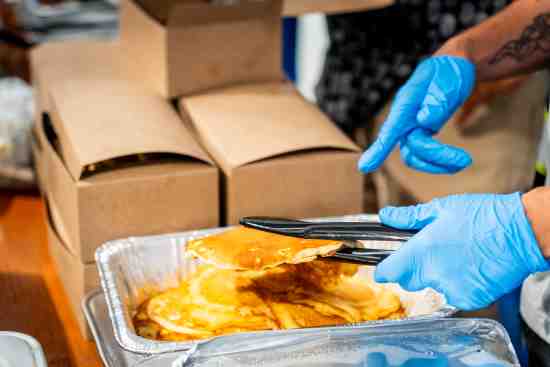 This innovative nonprofit takes in surplus produce from farms, grocery stores and other food distributors, plus spare ingredients from local restaurants, and transforms them into delicious, high-quality meals. Since their first Upcycling Kitchen opened in 2021, the chefs have prepared more than 250,000 meals. The meals are all prepared by professional, creative chefs who work together to craft weekly menus that make the best use of the food they have received. This allows them to immediately freeze or preserve the items that cannot be used in that week's meals and save them for a later date, preventing food waste. You’d never guess these meals were made from upcycled ingredients. The chefs at Make Food Not Waste have made a delicious frittata and potato hash with jerk corn relish as examples of their creativity.
This innovative nonprofit takes in surplus produce from farms, grocery stores and other food distributors, plus spare ingredients from local restaurants, and transforms them into delicious, high-quality meals. Since their first Upcycling Kitchen opened in 2021, the chefs have prepared more than 250,000 meals. The meals are all prepared by professional, creative chefs who work together to craft weekly menus that make the best use of the food they have received. This allows them to immediately freeze or preserve the items that cannot be used in that week's meals and save them for a later date, preventing food waste. You’d never guess these meals were made from upcycled ingredients. The chefs at Make Food Not Waste have made a delicious frittata and potato hash with jerk corn relish as examples of their creativity.
In addition to hands-on food recovery and preparation, technological advances also play a role in reducing waste. ReFED is a U.S.-based nonprofit that works with partners across the food system to solve food waste. Rather than relying on assumption, ReFED advocates for evidence-based solutions and identifies seven key action areas where the food system must focus its efforts for food waste prevention, rescue and recycling:
- Optimize the harvest
- Enhance product distribution
- Refine product management
- Maximize product utilization
- Reshape consumer environments
- Food waste rescue programs
- Food waste recycling programs and solutions
They are working towards improving these areas with their ReFED Insights Engine which serves as an online data center offering the latest insights, metrics and guidance to help decision-makers within the food system take action. The Insights Engine is currently the most comprehensive data source on food loss and waste in the U.S.
Building upon their data and insights, ReFED also works with businesses and provides custom analytics, capacity building and advisory services. Additionally, ReFED launched the Catalytic Grant Fund, a funding initiative designed to drive food system change. The Fund provides catalytic capital to organizations working on food waste solutions, helping them overcome system-level barriers and de-risk new innovations.
New Ideas and Solutions to Prevent Food Waste
Innovation is part of our DNA at Lineage, and we are constantly looking for ways to improve the food supply chain. In 2024, we hosted our Food Chain Innovation Challenge to help identify new solutions in the fight to combat food waste. Hundreds of teams applied, and the entries were assessed by an esteemed panel of judges who share our desire to build a better food chain. During the competition numerous solutions were identified, and one company was selected as the grand prize winner: Ryp Labs.
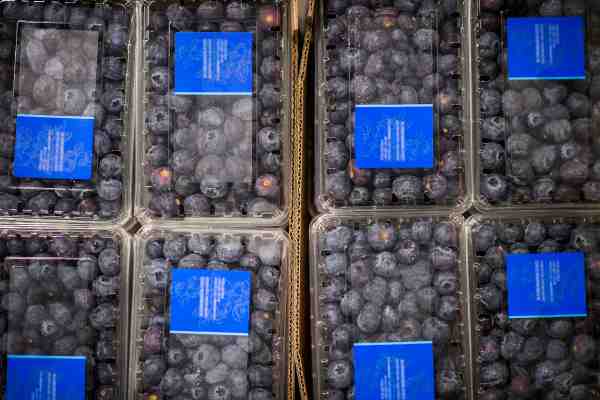 Ryp Labs is a startup working to address food waste by extending the shelf life of fresh fruits and vegetables – which are often a significant contributor of wasted food. Their unique solution mimics the natural defense mechanisms of plants to slow down the process of spoilage. They can apply this solution to various food-safe mediums – for example, stickers for placing on individual fruits as well as cardboard inserts or packets for larger areas and cases of produce – to help preserve the longevity of certain fresh fruits and vegetables by inhibiting microbial growth. Because Ryp Labs’ solution extends shelf life, food producers are able to increase product quality and get more food to retailers while consumers have more time to enjoy their produce once they’ve brought it home. It’s truly a win-win in the fight against food waste.
Ryp Labs is a startup working to address food waste by extending the shelf life of fresh fruits and vegetables – which are often a significant contributor of wasted food. Their unique solution mimics the natural defense mechanisms of plants to slow down the process of spoilage. They can apply this solution to various food-safe mediums – for example, stickers for placing on individual fruits as well as cardboard inserts or packets for larger areas and cases of produce – to help preserve the longevity of certain fresh fruits and vegetables by inhibiting microbial growth. Because Ryp Labs’ solution extends shelf life, food producers are able to increase product quality and get more food to retailers while consumers have more time to enjoy their produce once they’ve brought it home. It’s truly a win-win in the fight against food waste.
Another innovative approach to minimizing food waste is coming from the startup Mimica, which is redefining how we determine food freshness. Mimica has created a Bump Tag and Bump Cap – temperature sensitive indicators that provide accurate freshness information – to reduce unnecessary waste by combatting vague or confusing date labels. The products use a plant-based gel that responds to temperature changes and becomes bumpy when the food or drinks spoil. When the item goes bad, the gel flattens to reveal bumps that indicate the product is past its expiration. This approach is especially innovative because Mimica is aiming to address consumer behaviors that contribute to food waste. Many people go by the date on their food as the only factor to judge if their food is still safe to eat and, as a result, may throw away perfectly good food out of an abundance of caution. Mimica is making it possible for consumers to get more out of their food while still having peace of mind.
Of course, technology and innovations alone are not enough to end food waste. Logistics and community support matter, too. B12Give is an organization that works to take surplus food and redistribute it to those in need. They are driven to redistribute 100% of surplus food across Canada by 2040. To achieve this goal, B12Give aims to be the leading logistics partner for food retailers along the food supply chain who want to put their unused food to good use and to eliminate surplus from their operations. The company was founded by Tony Colley who had personally experienced food insecurity and financial hardship. He began a job with a catering company and saw how much uneaten, perfectly good food they threw away after events. Witnessing this waste moved him to take action. He started the journey to help feed himself and others by redistributing the excess food to local shelters during his commute. His passion for redistributing food to those in need has blossomed into an impactful organization that helps many Canadians and provides other companies with a solution to reduce food waste. So far, B12Give has collected 70,000 pounds of food leading to 55,000 meals being provided.
Together, these organizations and companies are reshaping the future of food. Their determination and compassion are leading them to create change when it comes to food waste while also helping to battle food insecurity. Through partnerships, innovation and a commitment to sustainability, they’re proving that a world with less waste and more nourishment is within reach. We are encouraged by the efforts of new startups and entrepreneurs who are addressing food waste in creative new ways.
A Better Food Chain is Possible… Let’s Build it Together
Lineage is heavily focused on continuous improvement as we work to reimagine the global food supply chain to fight food insecurity and eliminate waste at our facilities. But there are many ways anyone can get involved in the fight to combat food waste. Whether that is volunteering at one of the amazing nonprofits discussed above, implementing one of these innovative products in your company's operations or reducing your own food waste at home. Every step towards sustainability in the food chain, no matter how big or small, adds up to make an impact.
